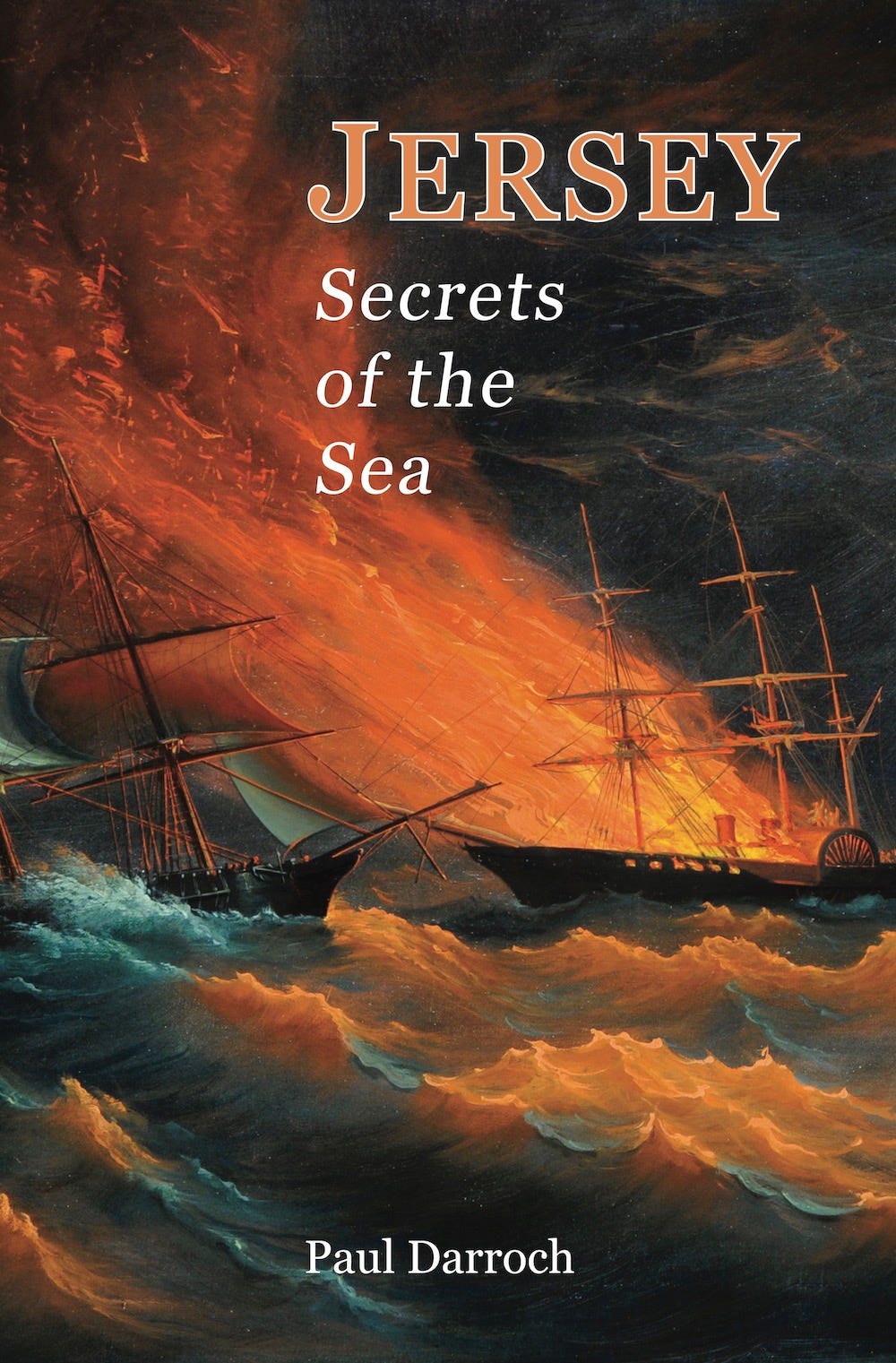Les Cris des Tombelènes - A Medieval Tragedy
Thank you for subscribing to The History Islands. I’m Paul Darroch, the author of Jersey: The Hidden Histories and Jersey: Secrets of the Sea. This newsletter is the place to enjoy my articles on the Channel Islands and other far-flung corners of the British Isles. The stories are free to read and you can unsubscribe at any time. This week it’s another wintry tale - the ancient Jersey legend of Les Cris des Tombelènes. I hope you enjoy it.
Jersey, Autumn 1462
September ended with storms. The shortening days flickered past like a parade of guttering candles, and the people cowered in their hovels. They said the sheep-stealers were riding harder now, emboldened by the darkening nights.
These were evil days. Abetted by treachery, the King of France had conquered Jersey, and his fleur-de-lys banner hung over Mont Orgueil. The administration of justice had ground to a halt, and the Warden of the Isles had fled. Armed gangs of criminals – deserters, irregulars, vagabonds – roamed the countryside on horseback. They rustled sheep, gorged on the fat of the land, and filled their boots with whatever they could kill for.
Yet even in these darkest hours, love and life would not be forsaken. One night, at the head of Bouley Bay, smoke drifted up into the night, for a betrothal feast was at hand. In these straitened times, it was rare enough to see any Assise de Veille, any snatched feast of celebration.
Tonight, the halls of Farmer Raulin’s house were decked with the flowers of the forest: St John’s herb, heather, the last blooms of late summer. A crowd of friends and well-wishers from the parish of the Holy Trinity had gathered there to greet a newly engaged couple. A feast was served in their honour, and fat barrels of cider were split open. They had been scrupulously hoarded for such a time as this, a final fling before the bleak onset of Winter.
For Old Farmer Raulin’s only son and heir, the younger Raulin, had pledged his troth to Jeanne du Jourdain, fair maiden of the parish. Her eyes glinted green beside him in the firelight, smitten with love. The betrothal guests shovelled clumps of vraic onto the fire, and it crackled and burned ever brighter.
The revels were ending now, a ceremony crowned by a song. After much cajoling and persuasion, the shy bridegroom-to-be burst into voice. It was a chanson in pure and melodious Jersey French, a song of love and beauty and hope. His beloved melted into his arms, and they danced in the night.
The dance was broken by a knock on the door. It was brutal and insistent, the sound of approaching death. A stranger loomed at the threshold. He wore the chainmail of a French knight, but one who had deserted his own army to serve himself alone. Coldly, he turned to Farmer Raulin: “You did not invite me to your feast, you peasant! Kneel at my feet and plead for mercy”. Yet the old man straightened his spine defiantly, his breath freezing in the chill of the night. He refused to yield.
The younger Raulin’s blood exploded in rage, sickened at the insult to his father’s honour. Drunk on his own courage, he swaggered up to the intruder. “Get out of here - before I kick you out like a dog! This is my father’s house; this hearth is ours. Begone!”
Silence hung there like an axe, suspended. The stranger grimaced. His was a cold and unyielding fury, as chilling as the northern rain. At last, he spoke, and his words lingered long after he had slipped away. “Your life is forfeit, my child. Your account will be settled, and that soon enough”.
The stranger was gone. A raven screeched behind him in the night.
Long after midnight, an exuberant Raulin escorted his fiancée Jeanne and her family home to their farmstead. She wept with fear, shaking with dread, begging him to take Fidèle, her loyal dog, to guard him on his journey home. Yet Raulin felt fearless. He had faced boldly up to the oppressor this day and seen him off. Tonight he had become a man, and soon enough he would take his vows as a husband too, at the altar beneath the angels and the incense, in the church of the Holy Trinity. His road was hallowed now; every path would lead him home. He strode off into the night, her hound at his heels.
At a lonely crossroads, Fidèle abruptly stopped, and let out a heart-breaking, terrified whine. For a moment, the night was utterly silent, concealing its secrets. Then a band of horses clattered over the horizon. These were powerful steeds, bearing masked men, riding in force. In the moonlight, Raulin glimpsed flashes of heavy weaponry: swords, axes, battle shields. Instinctively, like a field-rat, he scurried into a ditch, willing himself to sink into its muddy, cold embrace.
The men passed. Then the sky cracked with a bolt of lightning. For a moment an electric white light burst over Jersey, flooding the fields like high noon. He ran, but there could be no escape now. He heard oaths, saw a blade slash at his brave dog. Then a mace was raised, and the back of his head was smashed like a snail’s shell. Five burly men seized his limp body, binding his hands, throwing him onto the back of a horse like a stolen sheep.
Warmth filtered back first, just before the pain. Raulin was somewhere by the fireside again, dancing with his beloved. Then the sticky agony of his skull splintered the dream. He was indeed by a fire, but trapped somewhere in a dark cave, deep within a cliff, above a black beach.
The storm waters thundered and foamed outside; but in this den of thieves, all was merriment. The sheep-stealers feasted on legs of stolen mutton and downed jars of cider. Shadows flickered and danced on the walls. The brigands stuffed and gorged and belched. At last, they remembered their tethered victim; and they decided to hang him dead.
And then, as they tightened the rope around his neck, something unexpected happened. His beloved, beautiful Jeanne ran into his arms.
Somehow, in the bitter hours of darkness, her whimpering, wounded dog had limped home. Fidèle’s blood-trail stained the dark country hedges. Woken by her bleeding, distressed hound, Jeanne had seized her courage and followed the trail to the foot of the cliff, down to the lair of the pirates. It was a fatal blunder. Now the robber chief sneered at his double prey. “Behold these two little lambs, caught in a hunter’s snare”, he bellowed. “Kill the boy; I will keep the girl for myself”.
In the darkness of the cave, armed men closed in. The gang surrounded them. Raulin, bound and wounded as he was, lurched forward to defend his beloved. There was a flash of steel in the darkness, and the first lamb was slain. Raulin bled to death on the rock-floor of the cave, his blood mingling with the rising waters. Then the pirate king closed in to seize Jeanne.
Too late, he realised she carried a concealed knife. With a primal shriek that could break the walls of the cave, Jeanne lunged straight at him. The blade broke clean in the chief’s sternum, and he was dead before his corpse hit the floor.
Jeanne ran straight towards the open mouth of the cave. The surviving robbers were gaining on her, but she kept climbing over the treacherous rocks. The storm was screeching higher, and violent waves were plunging in from the north. Jeanne looked back at the welter of lights and men, the frenzy of knives and torches. Then a black wall of water broke over her, and she was flung straight into the maw of the sea.
Her body was washed up days later on the October tides. The parishioners mourned and fasted; their fairest children were gone. Later that night, a funnel of carrion crows was seen rising from the base of the cliff. When the men of Trinity stumbled down into the empty cave, they found the wreckage of an abandoned feast. Two bodies lay on the cold stone floor; the pirate and his prey, broken in the shadows of the cave.
Today they call it Le Creux de Bouanne; and it is an accursed place. The north coast in these parts is a desolate and solitary shore. And when the tides roar in, and the waves shatter the high cliffs, they say that deep within the cave, you can still hear Jeanne wailing. The fishermen have an old name for this; Les Cris des Tombelènes.
We can hear her calling still, as the tides turn, as day becomes night, as the centuries scatter like pebbles on the seashore. She cries every night for her lost love, for a last glimpse of warmth and light, for everything that lies buried deep beneath the waves.
This story is based on the ancient Jersey legend of Les Cris des Tombelènes, as recorded in Philip Ahier’s Jersey Sea Stories. Paul Darroch is the author of Jersey: Secrets of the Sea, published by Seaflower Books, which is available across Jersey and also on Amazon.
(c) Paul Darroch 2021. All rights reserved.






